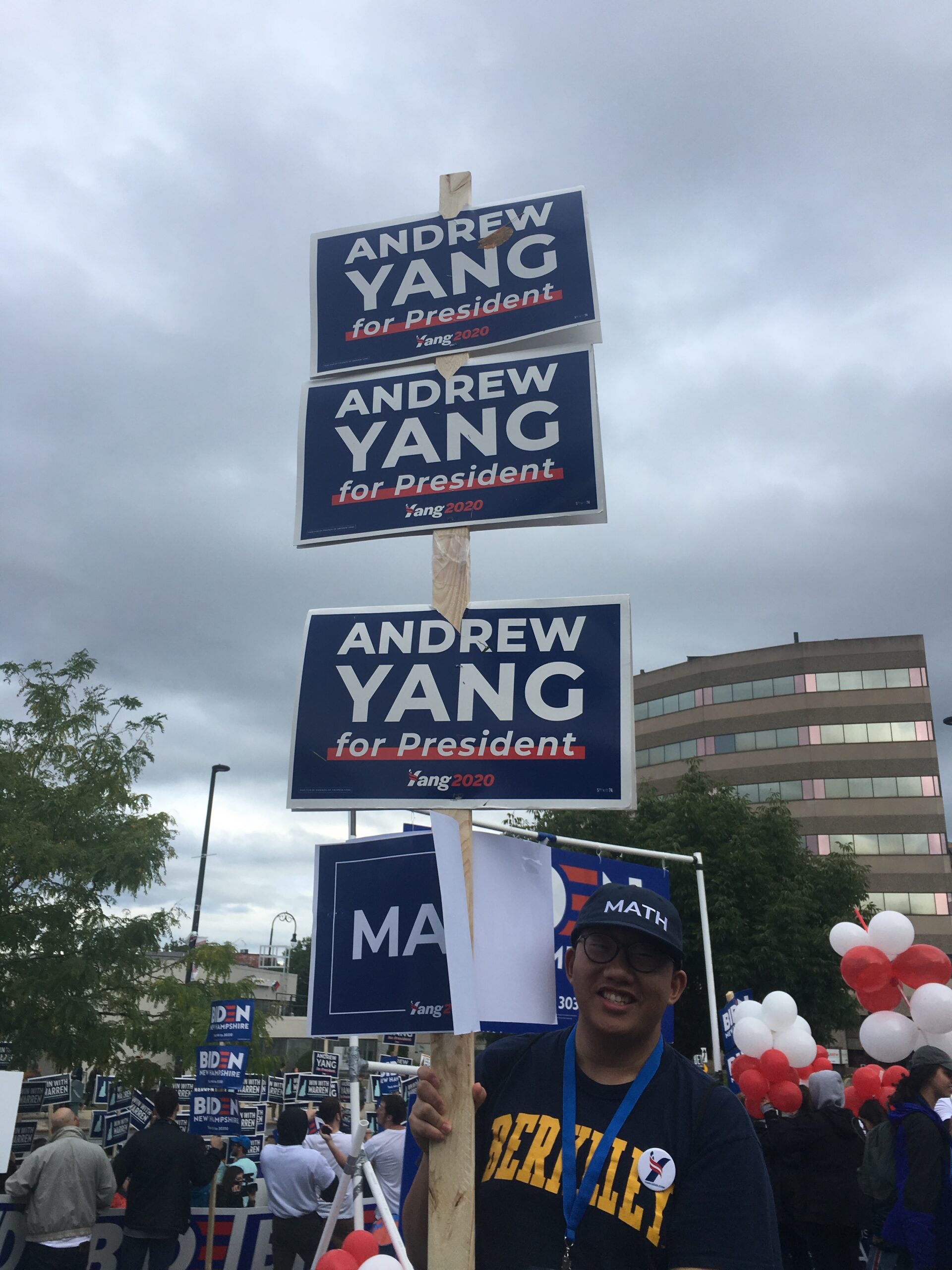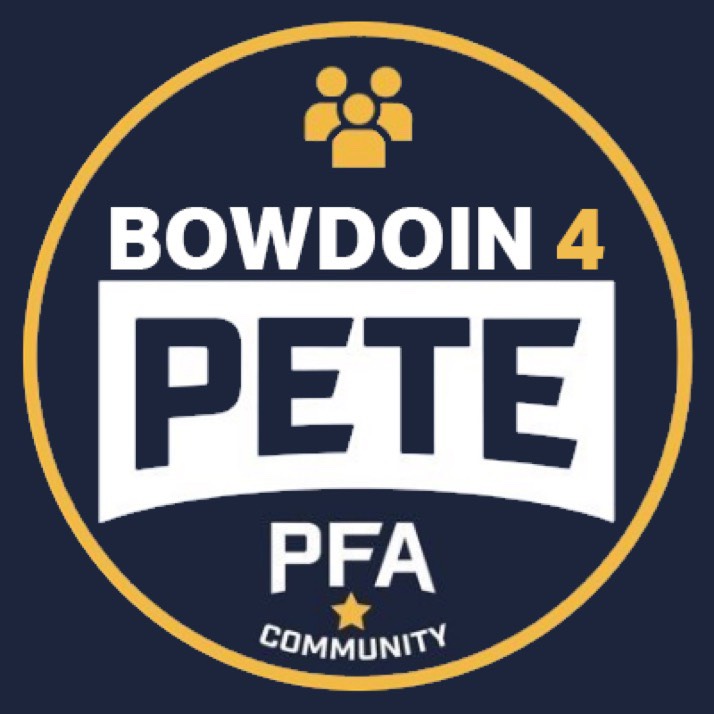Students work on senatorial, presidential campaigns as elections near
November 15, 2019
As Maine’s Democratic primary on Super Tuesday approaches, students across campus are bringing the race to Bowdoin.
Presidential campaigns realized the power of the college-student voting block; the rates of college students who voted doubled in 2018. There are 10 million eligible voters that attend college in the U.S., and presidential hopefuls have started to engage some of these students, hoping to energize campuses and gain momentum for their campaigns.
 Courtesy of Justin Ko
Courtesy of Justin KoJustin Ko ’22 co-directs organizing in New England for Andrew Yang’s presidential campaign. In charge of the texting campaigns, he monitors when messages need to be sent to a certain region.
Although Ko was never directly involved in politics before his work with Yang, he has always valued being politically engaged.
“I’m from Korea originally … and just 50 years ago Korea [had] an authoritarian government trying to take away democracy,” said Ko. “I just know that democracy is something that we really can’t take lightly. I think it’s a duty for every citizen that has the right to vote to make their voice heard.”
Elise Hocking ’22 and Wilder Short ’22 are also working on the presidential campaign of the South Bend, Ind. Mayor Pete Buttigieg as campus leads. Hocking is working to organize a group of Buttigieg supporters on campus in order to grow his visibility both on campus and in Maine.
Hocking acknowledges that Bowdoin’s small size could limit the effectiveness of her work.
“There’s only so much that we can do on this campus, and at a certain point, it might feel like we’re hitting a wall because we’re just hitting the people that are already firm believers in another candidate. It’s not necessarily the best use of our time,” Hocking said.
That said, she sees opportunities for students to mobilize outside of Bowdoin by working on campaigns in nearby New Hampshire or elsewhere in Maine. Other Bowdoin students are working for candidates in elections closer to home.
Eric Hall ’20 is interning for Speaker of the Maine House of Representatives Sara Gideon’s campaign for U.S. Senate. As part of the research team, his job is to vet people joining the campaign, as well as make phone calls and organize events. Originally from Lewiston, Maine, Hall said it’s important that his candidate had the best interests of his home state in mind, and that college is one of the best times to get involved politically.
“I think it’s important because now is actually when we have a pretty good chunk of free time if we block it out right,” Hall said. “I think it’s easy to get lost … in the details of college life and forget about what’s taking place just down the road or in our town of Brunswick.”
Micah Wilson ’22 and Livia Kunins-Berkowtiz ’22 both have a record of political activity, from campaigning in local elections to working for the Maine People’s Alliance. They have now started phone banking for Senator Bernie Sanders on Fridays, where they call undecided New Hampshire voters and discuss voting for Sanders.
“For me [being politically active] is [a] no-brainer,” Kunins-Berkowtiz said. “People’s lives can be drastically improved depending on elections.”
For Wilson, talking to people directly makes his work meaningful.
“I’ve had some amazing conversations [with] people over the phone that helped me remind myself that it’s work that does make a difference and that does matter, even if most of the time it can feel really menial and hard,” Wilson said.
Phone banking can be done by anyone at home with a laptop and phone, but Kunins-Berkowtiz and Wilson intentionally wanted to create a space where people can come together, have fun and learn from each other.
“There’s the organizing and then there’s the community side, and both things can often feel like they’re lacking if they don’t have the other going on,” Wilson said.
Though the organization will not endorse a candidate during the primary season, Bowdoin Democrats sees itself as a resource for students looking to get involved in campaigns and is supporting campaigning students by helping them organize and gather volunteers and resources.
Katherine Henneberger ’20, head of the group, says that although liberals on campus seem united in their beliefs, the organization represents students of varying political ideologies, citing a recent poll sent to the organization’s members about which candidate they are supporting.
 Courtesy of Elise Hocking
Courtesy of Elise Hocking“There’s a really wide breadth of people who are interested in different candidates. There’s not a majority for one person,” Henneberger said. “We imagine that we’re all liberal in the same strain, but we might not be.”
Bowdoin Democrats aims to give these different strains a place to discuss and organize. Bowdoin Republicans also does not plan to campaign as an organization for specific candidates in the coming election season.
When asked if there was a substantial interest in Republican campaigns on campus, Bowdoin Republicans member Theo de Quillacq ’21 replied, “Probably not. There’s very little to work with.”
However, the organization wants to continue the conversation on campus about conservative politics.
The lack of commentary on conservative politics from professors often hurts political diversity at Bowdoin, de Quillacq said, and he wishes that conservative voices from non-students were more vocal on campus.
“I don’t think people get both sides,” de Quillacq said. “It’s very tough to know what you believe in if you don’t know what you disagree with.”
Bowdoin Republicans member Matthew Swiatek ’20 also emphasized the organization’s role as a conversation starter on campus.
“We’re not trying to convert people, we’re not trying to tell people ‘this is what you have to believe.’ We’re telling people: ‘here’s valid arguments for what we believe and why’ and just asking people to listen to that and give it some genuine consideration,” Swiatek said.
Regardless of whether being politically active is familiar or completely new, these Bowdoin students agree that there is a place for everybody to get involved.
“I think the biggest misconception [that people have] probably is, ‘I don’t have the right tools for the job,’ but they’re really always looking for people,” Hall said. “Don’t be afraid to reach out to any level of government.”
For Hocking, her and other students’ political involvement is meaningful and rewarding.
“To feel like our work is being appreciated and that our input is being taken seriously in the campaign is really great,” she said.
Comments
Before submitting a comment, please review our comment policy. Some key points from the policy:
- No hate speech, profanity, disrespectful or threatening comments.
- No personal attacks on reporters.
- Comments must be under 200 words.
- You are strongly encouraged to use a real name or identifier ("Class of '92").
- Any comments made with an email address that does not belong to you will get removed.

Theo de Quillacq is Kavanaugh
#YangGang